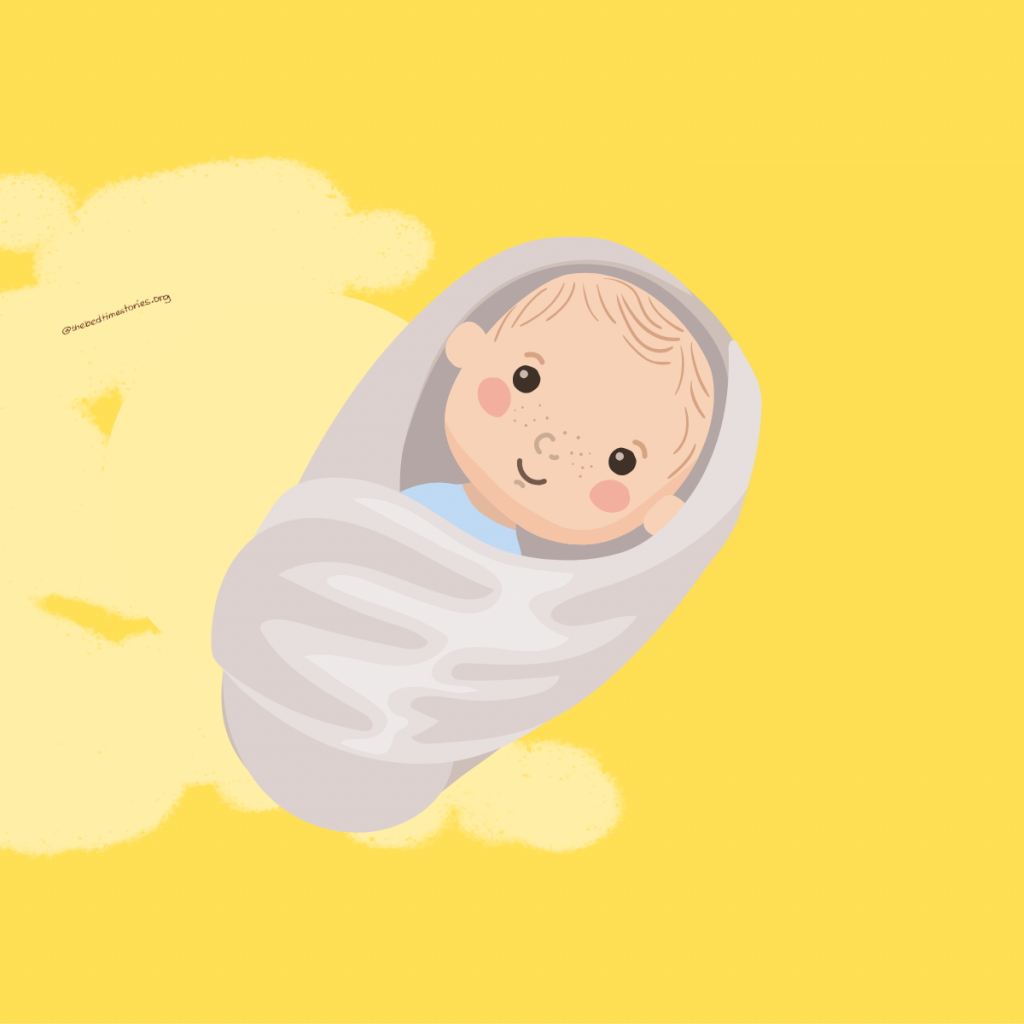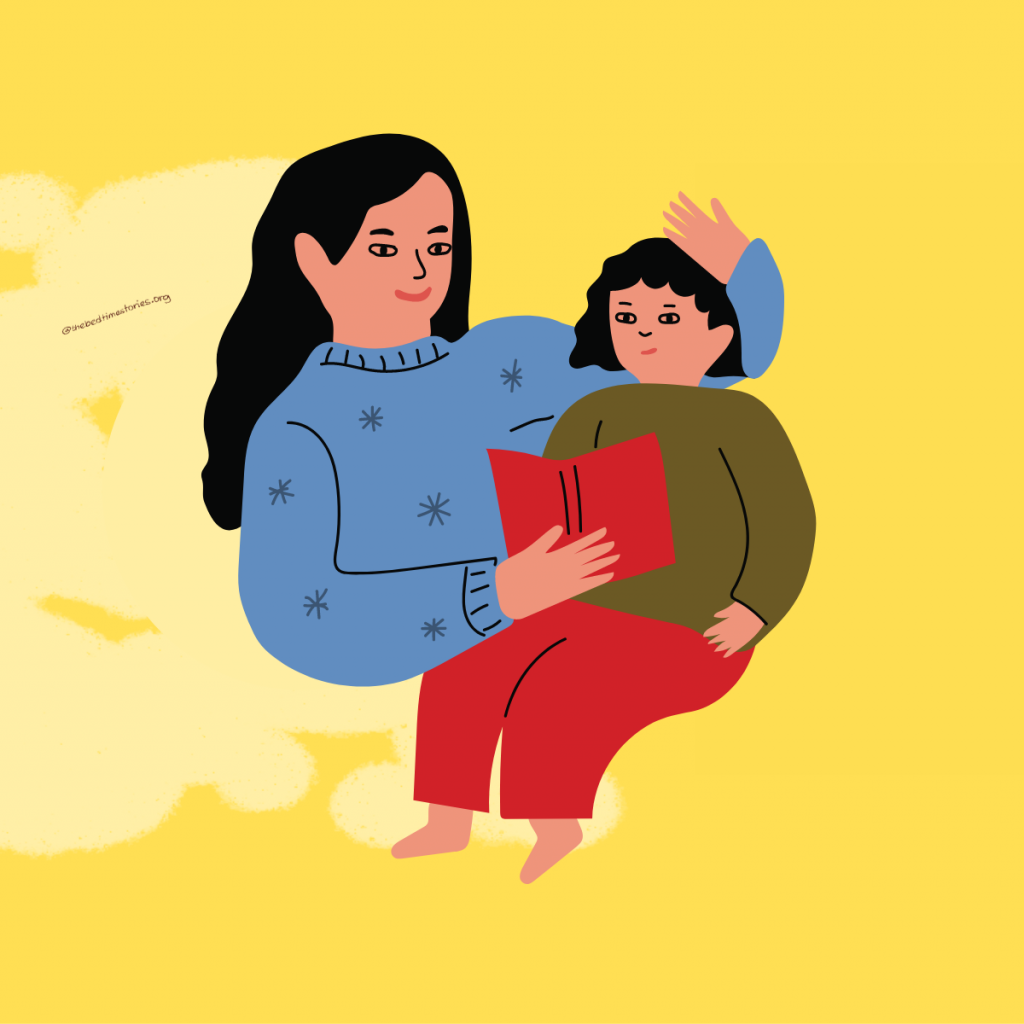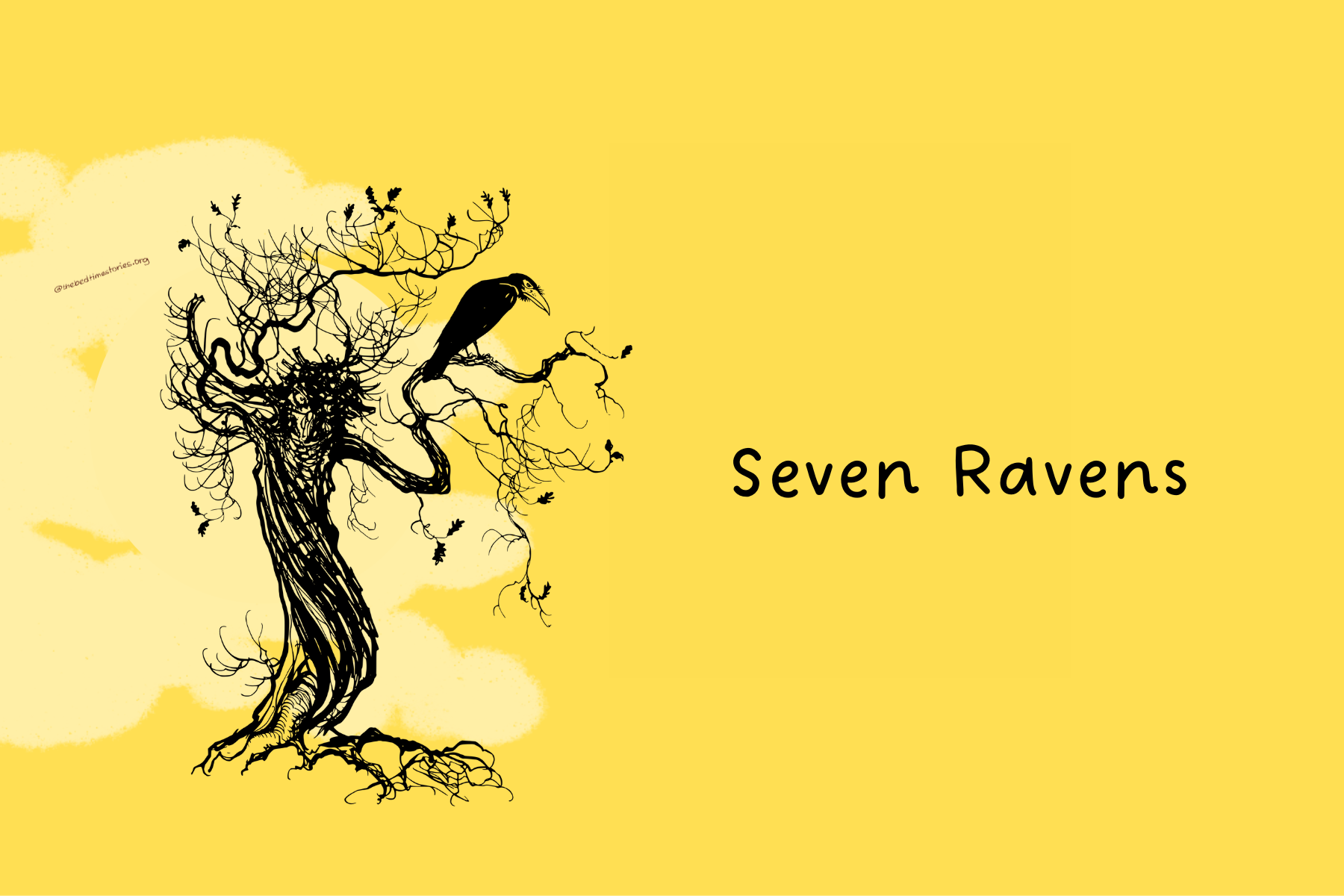Seven Ravens by Grimm Brothers
There was once a man who had seven sons, and still, he had no daughter, however much he wished for one. At length, his wife again gave him hope of a child; when it came into the world, it was a girl.
The joy was great, but the child was sickly and small and had to be privately baptized because of its weakness.

The father sent one of the boys in haste to the spring to fetch water for the baptism. The other six went with him, and as each of them wanted to be first to fill it, the jug fell into the well. There they stood and did not know what to do, and none of them dared to go home.
As they still did not return, the father grew impatient and said they had certainly forgotten it while playing some game, the wicked boys.
He became afraid that the girl would have to die without being baptized, and in his anger, cried, I wish the boys were all turned into ravens.
Hardly was the word spoken before he heard a whirring of wings over his head, looked up, and saw seven coal-black ravens flying away.
The parents could not withdraw the curse, and however sad they were at the loss of their seven sons, they still, to some extent, comforted themselves with their dear little daughter, who soon grew strong every day and became more beautiful.

She did not know that she had brothers for a long time, for her parents were careful not to mention them before her. Still, one day she accidentally heard some people saying herself that the girl was certainly beautiful, but that in reality, she was to blame for the misfortune which had befallen her seven brothers.
Then she was much troubled and went to her father and mother and asked if it was true that she had had brothers and what had become of them.
The parents no longer dared keep the secret but said that what had befallen her brothers was the will of heaven and that her birth had only been the innocent cause.

But the maiden took it to heart daily and thought she must save her brothers. She had no rest or peace until she set out secretly, and went forth into the wide world to search for her brothers and set them free, let it cost what it might.
She took nothing with her but a little ring belonging to her parents as a keepsake, a loaf of bread against hunger, a little pitcher of water against thirst, and a little chair as a provision against weariness.
And now she went continually onwards, far, far to the very end of the world. Then she came to the sun, but it was too hot and terrible, and she devoured little children. Hastily she ran away and ran to the moon, but it was far too cold and also awful and malicious, and when it saw the child, it said, I smell, I smell the flesh of men.
At this, she ran swiftly away and came to the stars, which were kind and good to her, and each of them sat on its own particular little chair.
But the morning star arose and gave her the drumstick of a chicken and said, if you do not have that drumstick, you can not open the glass mountain, and in the glass mountain are your brothers.
The maiden took the drumstick, wrapped it carefully in a cloth, and went onwards again until she came to the glass mountain. The door was shut, and she thought she would take out the drumstick. But it was empty when she undid the cloth, and she had lost the
good star’s present. What was she now to do? She wished to rescue her brothers and had no key to the glass mountain.
The good sister took a knife, cut off one of her little fingers, put it in the door, and succeeded in opening it. When she had gone inside, a little dwarf came to meet her, who said, my child, what are you looking for? I am looking for my brothers, the seven ravens, she replied. The dwarf said, the lord ravens are not at home, but if you wait here until they come, step in.
Thereupon the little dwarf carried the ravens’ dinner in, on seven little plates, and in seven little glasses, and the little sister ate a morsel from each plate, and from each little glass, she took a sip, but in the last little glass, she dropped the ring which she had brought away with her.
Suddenly she heard a whirring of wings and a rushing through the air, and then the little dwarf said, now the lord ravens are flying home.
Then they came, wanted to eat and drink, and looked for their little plates and glasses. Then said one after the other, who had eaten something from my plate. Who has drunk out of my little glass? It was a human mouth. And when the seventh came to the bottom of the glass, the ring rolled against his mouth.
Then he looked at it and saw that it was a ring belonging to his father and mother, and said, God grant that our sister may be here, and then we shall be free.
When the maiden standing behind the door watching heard that wish, she came forth, and on this, all the ravens were restored to their human form again. And they embraced and kissed each other and went joyfully home.
Seven Ravens by Grimm Brothers
Seven Ravens is a very well-known Children’s Fairy Tales story. It’s one of the quintessential short stories in every children’s book. Written by the Grimm brothers, it is a monumental piece of children’s literature.
Best Photo Editing Website: Click Here
Read more short stories like ‘Seven Ravens’
About Grimm Brothers:
(via Wikipedia)
The Brothers Grimm (die Brüder Grimm or die Gebrüder Grimm), Jacob (1785–1863) and Wilhelm (1786–1859), were German academics, philologists, cultural researchers, lexicographers, and authors who together collected and published folklore.
They are among the best-known storytellers of folk tales, popularizing stories such as “Cinderella” (“Aschenputtel”), “The Frog Prince” (“Der Froschkönig”), “Hansel and Gretel” (“Hänsel und Gretel”), “Little Red Riding Hood” (“Rotkäppchen”), “Rapunzel”, “Rumpelstiltskin” (“Rumpelstilzchen”), “Sleeping Beauty” (“Dornröschen”), and “Snow White” (“Schneewittchen”). Their first collection of folk tales, Children’s and Household Tales (Kinder- und Hausmärchen), began publication in 1812.
Read more like ‘Seven Ravens’: More Stories
The brothers spent their formative years in the town of Hanau in the Landgraviate of Hesse-Kassel. Their father’s death in 1796 (when Jacob was eleven and Wilhelm was ten) caused great poverty for the family and affected the brothers many years after.
Read more like ‘Seven Ravens’: Adventure Stories
Both brothers attended the University of Marburg, where they became curious about German folklore, which grew into a lifelong dedication to collecting German folk tales.
Read more like ‘Seven Ravens’: Kid’s Stories
The rise of romanticism in the 19th century revived interest in traditional folk stories, which to the brothers represented a pure form of national literature and culture. Intending to research a scholarly treatise on folk tales, they established a methodology for collecting and recording folk stories that became the basis for folklore studies.
Read more like ‘Seven Ravens’: Fairy Tales
Between 1812 and 1857 their first collection was revised and republished many times, growing from 86 stories to more than 200. In addition to writing and modifying folk tales, the brothers wrote collections of well-respected German and Scandinavian mythologies.
Read more like ‘Seven Ravens’: Moral Stories
In 1838 they began writing a definitive German dictionary (Deutsches Wörterbuch) which they could not finish during their lifetimes.
Read more like ‘Seven Ravens’: Kid’s Stories
The popularity of the Grimms’ collected folk tales has endured well. The tales are available in more than 100 translations and have been adapted by filmmakers (including Lotte Reiniger and Walt Disney), in films such as Snow White and the Seven Dwarfs.
Read more like ‘Seven Ravens’: Fables
In the mid-20th century, the tales were used as propaganda by Nazi Germany; later in the 20th century, psychologists such as Bruno Bettelheim reaffirmed the value of the work despite the cruelty and violence in original versions of some of the tales, which the Grimms eventually sanitized.
